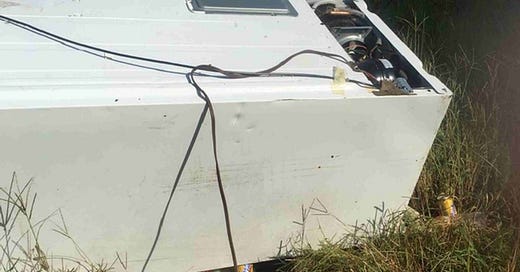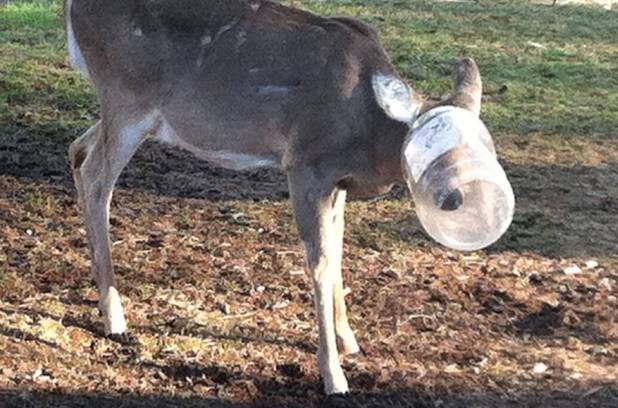I haven’t been able to observe much of Mother Nature’s handiwork lately. The house I’m staying in is on a main road, so my morning walks are along narrow shoulders or in a field smothered with pesticides. Very boring – not many native plants to admire. Oh, how I miss my old stomping grounds where I found so many beautiful wildflowers.
However, there is one thing I find anywhere I walk.
Litter, Litter Everywhere
Sadly, the only thing my rural walks have in common with my current urban route is litter. I reread some of my old blog posts and recalled how aggravating it was to pick up after the slobs who threw trash out along the roadside. At least once a week, I carried a bag with me to gather cans, bottles, empty cigarette packs, styrofoam take-out trays, cigarette butts, paper and plastic wrappers, cups, and even diapers. Someone even dumped a refrigerator filled with empty beer cans and bottles in a field. That, to me, was the epitome of pathetic disrespect for nature and humanity. How could anyone sink so low?
Luckily, our county’s public works department brought in the heavy equipment and cleaned up the mess.
I’ve noticed it’s the same along the urban streets. The roadsides are covered in the same types of trash (except the fridge, so far). Yet, no one seems to care.
The solution is so simple. Carry a bag in the car and place your daily accumulation of trash inside that bag. When you arrive home, carry the bag inside and dispose of the waste. Voila, no litter, no pollution, and all the life that shares this planet with us benefits from your thoughtfulness. Plus, when parents act as responsible role models, their kids will continue the environmentally friendly practice, passing it along to future generations. It’s a win-win for humanity and the environment.
Litter Affects the Health and Well-Being of our Planet
I am a conservationist. Environmental conservation pertains to the land, water, air, and ALL the critters (invertebrates, aquatic creatures, avians, and wildlife) that depend on having a functioning ecosystem for survival. Nature, from the tiniest bug to the giant whales, is interconnected and relies on maintaining Mother Nature’s balance. All the litter, chemicals, and junk polluting the land and sea not only look terrible but also affect all these creatures as they try to make their living.
According to Keep America Beautiful, over 51 billion pieces of litter appear on U.S. roadways each year. Wildlife, aquatic creatures, and birds are innocent victims of rubbish, ingesting or becoming injured by or being entrapped in improperly discarded trash. Some of the obstacles they encounter are:
getting their heads or other parts of their body stuck in plastic six-pack rings, bags, bottles, or other containers
eating household toxic waste and cleaners from garbage bins, resulting in extreme illness or death
mistaking plastic or latex (e.g., balloons, disposable gloves) for food, making them sick or blocking their digestive tract, causing them to starve
suffocating inside plastic bags
getting tangled in string, ropes, or netting, rendering them unable to free themselves.
Animals have a keen sense of smell and sight. They follow their noses to the source of interesting aromas wafting from recently discarded items. We’ve all seen pictures of animals with their heads stuck inside a tin can. The ones photographed are the lucky ones who received help, but how many other curious creatures are fated to wander around aimlessly, slowly suffocating or starving to death?
The worst part is that they have no idea what’s happening. No one can tell a deer or a possum to avoid sharp bits of metal or glass peppering the landscape. They cannot comprehend that a broken beer bottle or rusty metal will inflict cuts and punctures that will become infected. And when the inevitable happens, there are no walk-in clinics where these creatures can get antibiotics or a tetanus shot. They’re doomed to die from the infection.
Something I’ll bet you didn’t know — just a tiny bit of chewing gum stuck in their fur or feathers can impede an animal’s or bird’s mobility. If swallowed, the gum can create blockages in their throats or digestive systems.
It’s estimated that over a million animals, birds, and sea life die each year from improperly discarded trash. That’s an unfortunate fact that could be avoided very simply.
Okay, I’ll get off my soapbox and leave you with this:
Conservation is more than planting native flowers, trees, and shrubs. We also have to step back and look at the big picture.
So, while you’re landscaping your yard with native plants, keep in mind that we need to take care of the rest of our planet, too. Start today. Put that garbage bag in your car. Start your family’s no-litter policy right now!
~~~~~~~~~~~~~~~~~~~~~~~~~~~~~~
Dear Reader,
I'd be ever so grateful if you would take a few minutes to recommend Let's Get Our Hands Dirty to your followers on Substack and other social media platforms.
Thank you!
Greta
--------------------------
Let's Get Our Hands Dirty is a reader-supported publication. This post is free as are all my posts. Please subscribe so you can receive notification when new articles are published. I'd love for you to become a part of our nature-loving family. Basic subscriptions are free, but if you sign up for a paid subscription as a love offering, that would be wonderful and greatly appreciated!
Have a fabulous day,
Greta
Please use the buttons below to Like, Comment, Restack, and Share my post on Substack and other social media platforms.
THANK YOU SO MUCH!







The biggest problem is that people don't care! They may hear "don't litter" but ignore it. They don't care about the environment, nature, stewardship, or the future. It doesn't affect them personally. They do what's easy - toss their garbage out and forget about it. Very sad.
Sorry that the only way I can applaud what you've written is to heart it. There should be a breaking-heart symbol as an alternative. Nevertheless, well done.